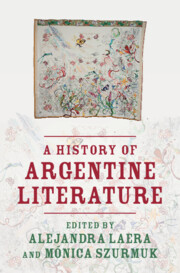Book contents
- A History of Argentine Literature
- A History of Argentine Literature
- Copyright page
- Contents
- Figures
- Contributors
- Editors’ Acknowledgments
- Introduction
- Part I Literary Dates
- Part II Critical Inroads
- Part III Literary Names
- Chapter 21 Sarmiento: Politics, Culture, and Spectacle
- Chapter 22 The Mansilla Siblings: A Story in Syntony
- Chapter 23 Martín Fierro: Subaltern Voices
- Chapter 24 Borges and Argentine Literature: A Detour around the World
- Chapter 25 Roberto Arlt
- Chapter 26 The Ocampo Sisters
- Chapter 27 Alfonsina Storni and Alejandra Pizarnik
- Chapter 28 Displacement and Transfer in Julio Cortázar’s Todos los fuegos el fuego
- Chapter 29 Manuel Puig’s Circuit Bending: Literary Listening against Surveillance
- Chapter 30 Operation Massacre: Dangerous Journalism
- Chapter 31 The Politics of the Poem: From Gelman to Perlongher
- Chapter 32 Scenes from Postmodern Life: Literary Interventions in the Public Sphere
- Chapter 33 Griselda Gambaro and Beyond: A “Dermography” of Contemporary Women’s Theater and Performance
- Chapter 34 César Aira and the Art of Invention
- Index
- References
Chapter 28 - Displacement and Transfer in Julio Cortázar’s Todos los fuegos el fuego
from Part III - Literary Names
Published online by Cambridge University Press: 09 May 2024
- A History of Argentine Literature
- A History of Argentine Literature
- Copyright page
- Contents
- Figures
- Contributors
- Editors’ Acknowledgments
- Introduction
- Part I Literary Dates
- Part II Critical Inroads
- Part III Literary Names
- Chapter 21 Sarmiento: Politics, Culture, and Spectacle
- Chapter 22 The Mansilla Siblings: A Story in Syntony
- Chapter 23 Martín Fierro: Subaltern Voices
- Chapter 24 Borges and Argentine Literature: A Detour around the World
- Chapter 25 Roberto Arlt
- Chapter 26 The Ocampo Sisters
- Chapter 27 Alfonsina Storni and Alejandra Pizarnik
- Chapter 28 Displacement and Transfer in Julio Cortázar’s Todos los fuegos el fuego
- Chapter 29 Manuel Puig’s Circuit Bending: Literary Listening against Surveillance
- Chapter 30 Operation Massacre: Dangerous Journalism
- Chapter 31 The Politics of the Poem: From Gelman to Perlongher
- Chapter 32 Scenes from Postmodern Life: Literary Interventions in the Public Sphere
- Chapter 33 Griselda Gambaro and Beyond: A “Dermography” of Contemporary Women’s Theater and Performance
- Chapter 34 César Aira and the Art of Invention
- Index
- References
Summary
Published during the debates around the role of the author in response to the Cuban Revolution, at the height of the Latin American literary Boom, Todos los fuegos el fuego (1966) emerges not only as a culmination of Julio Cortázar’s short fiction but also as a volume in dialogue with the literary, social, and political concerns of the time. Constant throughout this collection is the representation of characters who are displaced from familiar surroundings either physically, psychologically, or even fantastically. Characters are forced to share an uncomfortable space in “Autopista del Sur,” a story situated on the highway south of Paris that presents an allegory of human relations. Through the textual transposition of Che Guevara’s diaristic rendition of his trajectory through the Sierra Maestra Mountains in Cuba, “Reunión” also records the historical meeting of revolutionaries. Meanings produced through displacements develop also in the closing story of the volume, “El otro cielo,” in which Paris and Buenos Aires are seamlessly intertwined in the character’s experience. Displacement functions as an organizing thread through Todos los fuegos el fuego; transfers and reverberations in the stories generate disquieting tensions that reflect contemporary sociopolitical realities and the human condition.
- Type
- Chapter
- Information
- A History of Argentine Literature , pp. 439 - 450Publisher: Cambridge University PressPrint publication year: 2024

